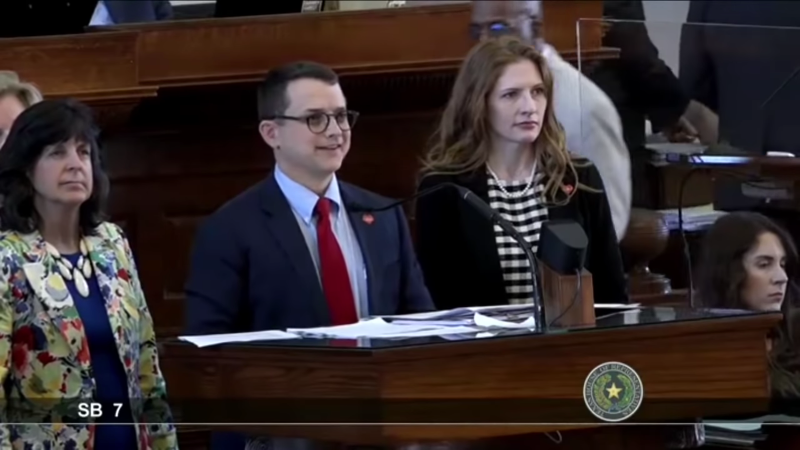The vote put Texas one step closer to joining other Republican-led states — Georgia, Iowa and Florida — that passed laws to add new restrictions to the voting process following repeated claims from former President Donald Trump and Republicans across the country that Trump lost his reelection race due to alleged voter fraud, even though no evidence of fraud at that scale has come to light.
The bill passed with a 81-64 vote just after 3 a.m Friday was an amalgamation of sorts of two separate Republican-authored measures: Senate Bill 7, which was passed by the state Senate in April, and House Bill 6, the other chamber’s companion bill written by Deer Park Republican state Rep. Briscoe Cain.
Once the Texas Senate passed SB 7 and sent it to the state House, Cain pulled a procedural move in the House’s elections committee that effectively replaced its text with that of HB 6, so the bill approved by the House Friday morning was technically SB 7 in name only.
That maneuver meant the House-approved bill doesn’t include provisions from the Senate bill that would ban Harris County innovations like drive-thru voting and 24-hour voting, and that would limit the number of voting locations in large counties like Harris County. The state House’s voting bill mostly creates new penalties for voter fraud and to punish election workers who make mistakes, forbids counties from sending unsolicited mail-in ballot applications, and gives partisan poll-watchers the power to record voters they think may be committing fraud, which Democrats have said could pave the way for more voter harassment of minorities by conservatives.
However, the more controversial measures from the state Senate’s original version of the bill could still be added back into the final version of the legislation out of the public eye.
When the state Senate and House pass different versions of the same bill, the Legislature has the power to convene a private committee with members from each chamber to iron out the differences, allowing them to choose which pieces of either version of the bill to include in the final version that would be sent to Gov. Greg Abbott for his signature.
When the House began debate on the GOP’s voting bill Thursday, Democrats focused on proposing dozens of amendments designed to weaken the bill, realizing that thanks to the House’s comfortable Republican majority, there was no real path toward torpedoing the legislation which they believe would suppress the vote of minorities across the state.
Ultimately, the Democrats got 20 amendments into the House’s version of SB 7. One amendment added language clarifying that if Texans vote illegally (for example, if a person is a felon barred from voting and still casts a ballot), they can only be charged with a crime if they realized they shouldn’t have been allowed to vote in the first place. Others changed the penalty for vote harvesting from a felony to a misdemeanor and would require the state to send voter registration applications to Texas high schools.
Cain, who previously flew to Pennsylvania to help with Trump’s attempt to overturn that state’s presidential election results, still insisted the state GOP’s push for change Texas’s voting laws isn’t about the last election.
“We don’t need to wait for bad things to happen to try to secure our elections,” Cain said.
Controversial language about preserving “the purity of the ballot box” originally included in the legislation was nixed after Democratic state Rep. Rafael Anchia pointed out how that line, which Cain said was pulled from the Texas Constitution, was intended to disenfranchise Black voters after the Civil War. Cain claimed he wasn’t aware of the racially-charged history of the line he lifted from the state Constitution.
The Texas House gave the bill another vote of approval on Friday afternoon, formally sending it over to the Senate for further debate or — most likely — the private conference committee process, so it’s still unclear just how restrictive the final version of the legislation that makes its way to Abbott for his approval will be.
Abbott, who chose “election integrity” as one of his emergency priorities for the 2021 legislative session, will surely sign the bill into law once it hits his desk. He has until June 20 to sign the final approved version into state law.
In response to the news of the overnight vote, Harris County Judge Lina Hidalgo issued this statement:
"The tentatively approved voter suppression law is built on a pernicious lie, a lie that corrodes our American democracy from within by pushing the falsehood that widespread voter fraud exists in Texas. Each time this lie is told, each time policies are passed based on this lie, our democracy is weakened.
I want to acknowledge the lawmakers that fought all night, and made some headway, to temper some of the most dangerous provisions in this bill.
Most importantly, the passage of this bill has once again made it mainstream in Texas for laws to be written that make voting more difficult. This is a dangerous path for Texas to travel."


